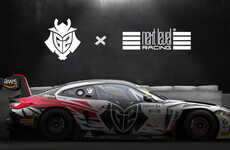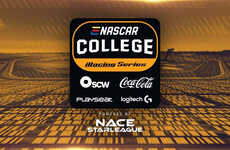
Lucas Ordoñez Takes 3rd in Real-Life Race at GT4 Cup
Marissa Brassfield — May 11, 2009 — Autos
References: autoblog
Lucas Ordoñez, who took third place at the GT4 Cup at Silverstone, is no typical professional racecar driver. He’s actually earned his spot on the GT Academy team in a way that no other professional racecar driver before him has done—by kicking ass at video games.
Lucas Ordoñez competed in and won the Nissan/Playstation GT Academy contest, which pitted avid gamers against each other playing ‘Gran Turismo’ for a slot in the real-life European GT racing championship.
The crew’s captain only predicted the GT Academy team would land in the top six, but Lucas Ordoñez took advantage of a crash late in the race and sped his way to third place in the GT4 Cup. Not bad for a nerdy gamer!
Lucas Ordoñez competed in and won the Nissan/Playstation GT Academy contest, which pitted avid gamers against each other playing ‘Gran Turismo’ for a slot in the real-life European GT racing championship.
The crew’s captain only predicted the GT Academy team would land in the top six, but Lucas Ordoñez took advantage of a crash late in the race and sped his way to third place in the GT4 Cup. Not bad for a nerdy gamer!
Trend Themes
1. Gamers as Racecar Drivers - The trend of gamers entering the racing industry by showcasing their skills in video games and earning spots on real-life racing teams presents an opportunity for innovation in talent recruitment and performance assessment.
2. Video Game Competitions - The trend of video game competitions, like the Nissan/Playstation GT Academy contest, offering opportunities for gamers to showcase their skills and potentially transition into professional sports, creates innovative paths for talent development and scouting.
3. Gaming Technology in Motorsport - The trend of using gaming technology, such as racing simulators, as a training tool for racecar drivers opens up opportunities to enhance skills, improve performance, and reduce costs in the motorsport industry.
Industry Implications
1. Esports - The esports industry can leverage the trend of gamers becoming professional racecar drivers to further expand their audience and create crossover events between virtual and real-life racing competitions.
2. Automotive - The automotive industry can embrace the trend of recruiting gamers with racing skills to develop innovative technologies and user interfaces for future vehicles, catering to the preferences and expectations of the gaming community.
3. Gaming Tech - The gaming tech industry can capitalize on the trend of gaming technology being used in motorsport by developing advanced simulators, virtual reality experiences, and motion-sensing devices specifically designed for racecar drivers to enhance their training and performance.
3.3
Score
Popularity
Activity
Freshness















